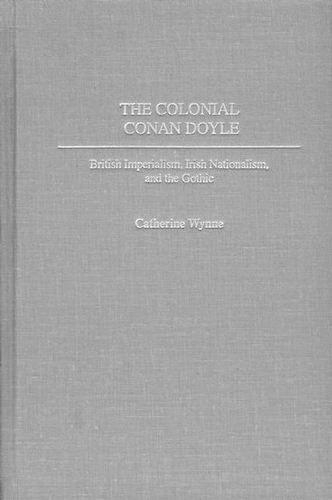
The Colonial Conan Doyle: British Imperialism, Irish Nationalism, and the Gothic
(Hardback)
Publishing Details
The Colonial Conan Doyle: British Imperialism, Irish Nationalism, and the Gothic
By (Author) Catherine Wynne
Bloomsbury Publishing PLC
Praeger Publishers Inc
30th July 2002
United States
Classifications
Tertiary Education
Non Fiction
Literary studies: fiction, novelists and prose writers
Literary studies: c 1900 to c 2000
823.912
Physical Properties
Hardback
224
Width 156mm, Height 235mm
482g
Description
Arthur Conan Doyle is often perceived as the quintessential Englishman, patriotically devoted to the Crown and the empire's defender and apologist. But such a relegation is both limiting and simplistic. Born in Scotland to Irish Catholic parents, Doyle's heritage is complex. His paternal grandfather, John Doyle, had originally left Ireland for London in the early 19th century; his father was committed to the cause of Irish separatism; and his uncle resigned from his position as main cartoonist for Punch after the journal launched an attack on the Pope. Consequently, British imperialism, Irish nationalism, and Catholic allegiance converge uneasily in his works. This book examines the resulting tensions between imperialism and colonialism in his writings. It argues that his thematic obsessions with topography, race, psyche, and sexuality stem from his ambivalence toward his own heritage. The volume repositions Doyle and redresses current critical approaches that have seen him solely as the advocate of empire and have ignored his colonial background. It explores how his fictions occur within a colonial context, the complexity of which is evident in gothic tropes of shifting landscapes, disguised criminalities, spiritualism, and sexual anomalies and conflicts.
Reviews
[W]ynne convincingly traces the tensions in Doyle's makeup, which are reflected in his oevure, and their embeddedness in a particular historical context. Her book offers a fresh perspective on an author usually remembered for his detective fiction and adventure stories.-The International Fiction Review
Do Irish matters haunt Doyle's fiction as Wynne claims They do, and she deserves every credit for revealing the extent of their leavening force.-Victorian Studies
The Colonial Conan Doyle not only helps us to rethink one writer's relation to empire, but it should also encourage us to reconsider with more nuance literature's relation to empire. Those relations are too often stymied by oversimplifications; Catherine Wynne's work should help us to see that such dealings are never so elementary as they may first appear.-English Literature in Transition 1880-1920
"Wynne convincingly traces the tensions in Doyle's makeup, which are reflected in his oevure, and their embeddedness in a particular historical context. Her book offers a fresh perspective on an author usually remembered for his detective fiction and adventure stories."-The International Fiction Review
"[W]ynne convincingly traces the tensions in Doyle's makeup, which are reflected in his oevure, and their embeddedness in a particular historical context. Her book offers a fresh perspective on an author usually remembered for his detective fiction and adventure stories."-The International Fiction Review
"Do Irish matters haunt Doyle's fiction as Wynne claims They do, and she deserves every credit for revealing the extent of their leavening force."-Victorian Studies
"The Colonial Conan Doyle not only helps us to rethink one writer's relation to empire, but it should also encourage us to reconsider with more nuance literature's relation to empire. Those relations are too often stymied by oversimplifications; Catherine Wynne's work should help us to see that such dealings are never so elementary as they may first appear."-English Literature in Transition 1880-1920
Author Bio
Catherine Wynne is Lecturer in 19th-Century English literature at the University of Hull. Her essays have appeared in such journals as History of Photography, Jouvert: A Journal of Postcolonial Studies, and Victorian Review.
